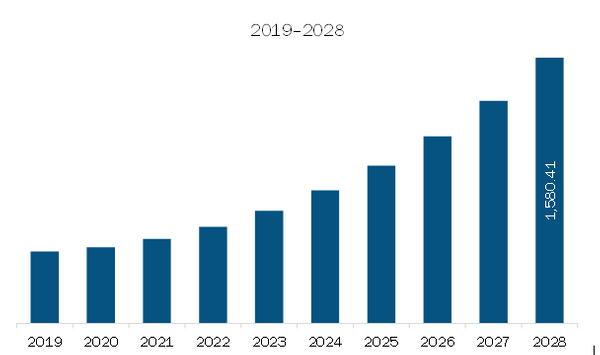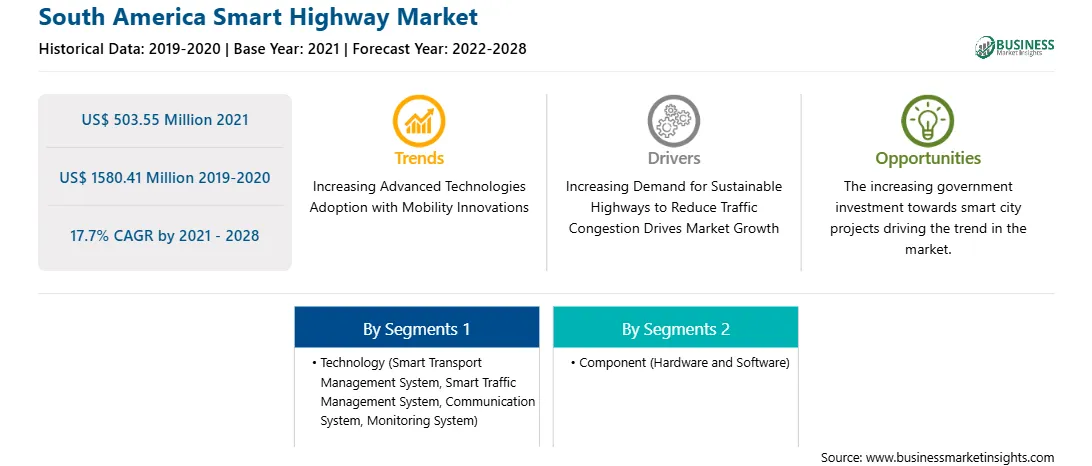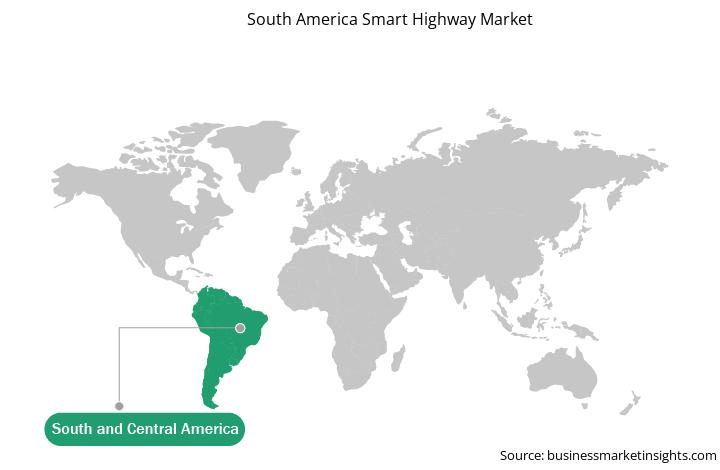The “Smart city” is an emerging concept, where urban areas are integrated with extensive sensor networks to promote ease of traffic flow and connectivity. Cities and towns around the world are undergoing significant changes to make the lives of the citizens better, more efficient, and eco-friendly. The mounting pressure to develop more effective roadways and highways is paving the way for smart infrastructures as an essential factor. Smart city roads built on IoT technologies allow them to collect and analyze data to improve day-to-day traffic and cater to long-term transportation needs. Further, advances in telecommunications, the Internet of Things, cloud and edge computing, and data analytics have made fast computing, data-empowered insights, connected mobility, and communications in a smart highway infrastructure easier. Therefore the origin of new concepts and advanced technologies in the smart highway market are anticipated to bolster the market in the years to come.
South American countries have been witnessing growth in a number of industries over the past few years. However, the COVID-19 pandemic has affected several sectors including infrastructural development activities in this region. Due to non-availability of raw materials, the market has been negatively affected, as the systems used in smart highways include various semiconductor components, most of which are imported from other countries. Due to supply chain disruption, the revamp of existing roadways and construction of new intelligent highway systems is on halt. As a response to the drastic impact of COVID-19 on transportation systems, various reports by the World Bank, ITU, GSMA and World Economic Forum suggest that major countries in South American region need to support digital industry supply chain by facilitating customs and logistical process, for example classifying network equipment as essential infrastructure. The countries are further ensuring access to and affordability of digital services by the majority public. These developments in the region, which are accelerated as a result of the COVID-19 pandemic, are creating positive growth prospects for smart highway market.
With the new features and technologies, vendors can attract new customers and expand their footprints in emerging markets. This factor is likely to drive the South America smart highway market. The South America smart highway market is expected to grow at a good CAGR during the forecast period.

Strategic insights for the South America Smart Highway provides data-driven analysis of the industry landscape, including current trends, key players, and regional nuances. These insights offer actionable recommendations, enabling readers to differentiate themselves from competitors by identifying untapped segments or developing unique value propositions. Leveraging data analytics, these insights help industry players anticipate the market shifts, whether investors, manufacturers, or other stakeholders. A future-oriented perspective is essential, helping stakeholders anticipate market shifts and position themselves for long-term success in this dynamic region. Ultimately, effective strategic insights empower readers to make informed decisions that drive profitability and achieve their business objectives within the market.

| Report Attribute | Details |
|---|---|
| Market size in 2021 | US$ 503.55 Million |
| Market Size by 2028 | US$ 1580.41 Million |
| Global CAGR (2021 - 2028) | 17.7% |
| Historical Data | 2019-2020 |
| Forecast period | 2022-2028 |
| Segments Covered |
By Technology
|
| Regions and Countries Covered | South and Central America
|
| Market leaders and key company profiles |
The geographic scope of the South America Smart Highway refers to the specific areas in which a business operates and competes. Understanding local distinctions, such as diverse consumer preferences (e.g., demand for specific plug types or battery backup durations), varying economic conditions, and regulatory environments, is crucial for tailoring strategies to specific markets. Businesses can expand their reach by identifying underserved areas or adapting their offerings to meet local demands. A clear market focus allows for more effective resource allocation, targeted marketing campaigns, and better positioning against local competitors, ultimately driving growth in those targeted areas.

The South America Smart Highway Market is valued at US$ 503.55 Million in 2021, it is projected to reach US$ 1580.41 Million by 2028.
As per our report South America Smart Highway Market, the market size is valued at US$ 503.55 Million in 2021, projecting it to reach US$ 1580.41 Million by 2028. This translates to a CAGR of approximately 17.7% during the forecast period.
The South America Smart Highway Market report typically cover these key segments-
The historic period, base year, and forecast period can vary slightly depending on the specific market research report. However, for the South America Smart Highway Market report:
The South America Smart Highway Market is populated by several key players, each contributing to its growth and innovation. Some of the major players include:
The South America Smart Highway Market report is valuable for diverse stakeholders, including:
Essentially, anyone involved in or considering involvement in the South America Smart Highway Market value chain can benefit from the information contained in a comprehensive market report.